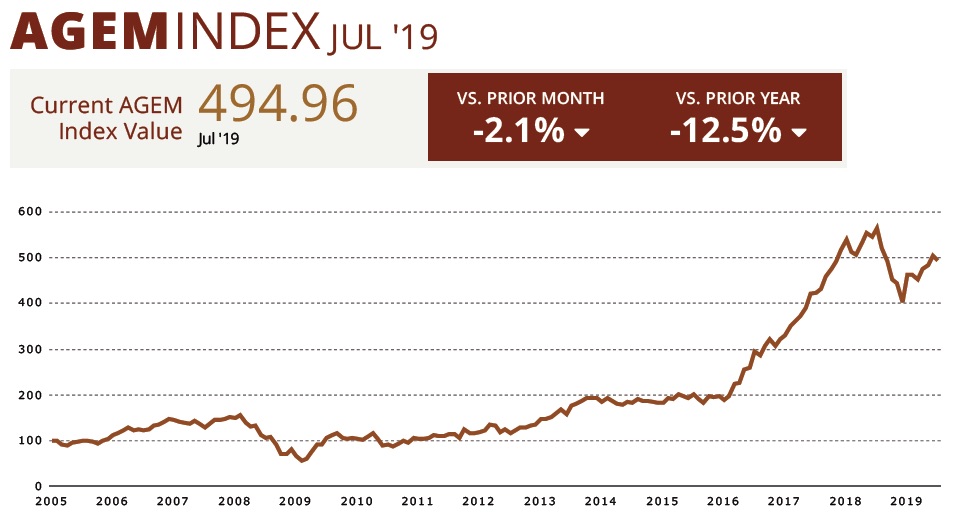Drop in Konami stock drags AGEM Index downward in July
Aug 06, 2019 Newsdesk Latest News, Top of the deck, World

The AGEM Index of the prices of shares in the main makers of gaming equipment around the world fell in July by 10.38 points to 494.96 points, or 2.1 percent less than in June.
The Association of Gaming Equipment Manufacturers (AGEM), which publishes the index, issued a written statement saying the index was 12.5 percent lower in July than a year earlier.
In contrast, the main gauges of stock prices in the United States all rose in July, the Dow Jones Industrial Average by 1 percent, the S&P 500 index by 1.3 percent and the NASDAQ index by 2.1 percent.

AGEM said the fall in the AGEM Index in July was due mainly to the price of shares in Konami Corp of Japan dropping by 8.1 percent, dragging the index down by 8.26 points.
The price of shares in Aristocrat Leisure Ltd of Australia fell by 0.2 percent, pulling the index down by 5.85 points.
The prices of five of the 13 stocks tracked by the index fell, but the prices of the rest rose.
Nine of the stocks are traded in the United States, two in Australia, one in Japan and one in Taiwan.
The index used to track the price of shares in Gaming Partners International Corp, but they were delisted at the NASDAQ in May when the company was taken private.
The AGEM Index is compiled every month by Applied Analysis LLC.
The index is a gauge of the prices of each component stock at the end of each month, adjusted for dividends and splits, and weighted roughly according to market capitalisation. The base value of the index is 100 points, set in January 2005.
AGEM represents manufacturers around the world of electronic gaming devices, systems, lotteries, and components for the gaming industry.
Related articles
-
 Spintec eyes growth in Australia as...
Spintec eyes growth in Australia as...Jul 18, 2024
-
 Star Ent shuts down EGMs, ETGs in all...
Star Ent shuts down EGMs, ETGs in all...Jul 15, 2024
More news
-
 Donaco EBITDA up y-o-y to above US$4mln...
Donaco EBITDA up y-o-y to above US$4mln...Jul 26, 2024
-
 HK listed Palasino upgrades Czech...
HK listed Palasino upgrades Czech...Jul 26, 2024
Latest News
Jul 26, 2024
Border-casino operator Donaco International Ltd has achieved a 164.17-percent year-on-year increase in its latest quarterly group earnings before interest, taxation, depreciation and amortisation...Sign up to our FREE Newsletter
 (Click here for more)
(Click here for more)
Pick of the Day
”We’ve got more traction outside of Macau at the moment. But Macau’s going be a bigger focus for us”
David Punter
Regional representative at Konami Australia
Most Popular
 Sheraton brand to exit Londoner Macao, to be Londoner Grand July 25, 2024
Sheraton brand to exit Londoner Macao, to be Londoner Grand July 25, 2024  Macau regulator probes unlicensed gaming agents July 24, 2024
Macau regulator probes unlicensed gaming agents July 24, 2024  Philippines gives 20k aliens in POGOs 60 days to leave July 25, 2024
Philippines gives 20k aliens in POGOs 60 days to leave July 25, 2024  Philippines-listed DigiPlus says not affected by POGO ban July 24, 2024
Philippines-listed DigiPlus says not affected by POGO ban July 24, 2024  Sands China 2Q EBITDA down q-o-q amid low hold, renovation July 25, 2024
Sands China 2Q EBITDA down q-o-q amid low hold, renovation July 25, 2024






